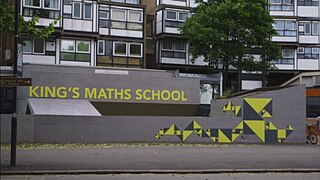The University of Brighton is a public university based on four campuses in Brighton and Eastbourne on the south coast of England. Its roots can be traced back to 1858 when the Brighton School of Art was opened in the Royal Pavilion. It achieved university status in 1992.

Language Colleges were introduced in 1995 as part of the specialist schools programme (SSP) in the United Kingdom. The system enabled secondary schools to specialise in certain fields, in this case, modern foreign languages. Schools that successfully applied to the Specialist Schools Trust and became Language Colleges received extra funding for language teaching from this joint private sector and government scheme. Language Colleges act as a local point of reference for other schools and businesses in the area, with an emphasis on promoting languages within the community. They are also encouraged to develop links with schools and other institutions in foreign countries. There were 216 Language Colleges in the country by 2010.

The specialist schools programme (SSP), first launched as the Technology Colleges programme and also known as the specialist schools initiative, specialist schools policy and specialist schools scheme, was a government programme in the United Kingdom which encouraged state schools in England and Northern Ireland to raise private sponsorship in order to become specialist schools – schools that specialise in certain areas of the curriculum – to boost achievement, cooperation and diversity in the school system. First introduced in 1993 to England as a policy of John Major's Conservative government, it was relaunched in 1997 as a flagship policy of the New Labour governments, expanding significantly under Prime Minister Tony Blair and his successor Gordon Brown. The programme was introduced to Northern Ireland in 2006, lasting until April 2011 in England and August 2011 in Northern Ireland. By this time, it had established a near-universal specialist system of secondary education in England, with almost every state-funded secondary school in England having specialised. This system replaced the comprehensive system which had been in place since the 1970s.

An academy school in England is a state-funded school which is directly funded by the Department for Education and independent of local authority control. The terms of the arrangements are set out in individual academy funding agreements. 80% of secondary schools, 39% of primary schools and 43% of special schools are academies.

Business and Enterprise Colleges (BECs) were introduced in 2002 as part of the Specialist Schools Programme in England. The system enabled secondary schools to specialise in certain fields. Schools that successfully applied to the Specialist Schools Trust and became Business and Enterprise Colleges received extra funding for applied business teaching from this joint private sector and government scheme. Business and Enterprise Colleges act as a local point of reference for other schools and businesses in the area, with an emphasis on promoting enterprise and commercial awareness within the community.

Greig City Academy is a mixed-sex secondary school in the London borough of Haringey. It has around 1,100 pupils on its roll.
SSAT Limited is a UK-based, independent educational membership organisation working with primary, secondary, special and free schools, academies and UTCs. It provides support and training in four main areas: teaching and learning, curriculum, networking, and leadership development.

An Arts College, in the United Kingdom, is a type of specialist school that specialises in the subject fields of the performing, visual, digital and/or media arts. They were announced in 1996 and introduced alongside Sports Colleges to England in 1997, being one of the five "practical specialisms" of the specialist schools programme. They were then introduced to Scotland in 2005 and Northern Ireland in 2006. By 2011, when the programme ended, there were over 491 Arts Colleges in England. More have been introduced since then, however schools must be an academy, free school or use the Dedicated Schools Grant to become one.

In the United Kingdom, a Technology College is a specialist school that specialises in design and technology, mathematics and science. Beginning in 1994, they were the first specialist schools that were not CTC colleges. In 2008, there were 598 Technology Colleges in England, of which 12 also specialised in another subject.

Humanities Colleges are a type of specialist school introduced in 2004 as part of the Specialist Schools Programme in the United Kingdom. The system enabled secondary and primary schools to specialise in certain fields, in this case, humanities. Schools that successfully applied to the Specialist Schools Trust and became Humanities Colleges received extra funding from this joint private sector and government scheme. Humanities Colleges act as a local point of reference for other schools and businesses in the area, with an emphasis on promoting humanities within the community.

Music college has a different meaning in the United Kingdom and Russia.

Science Colleges were introduced in 2002 as part of the now defunct Specialist Schools Programme in the United Kingdom. The system enabled secondary schools to specialise in certain fields, in this case, science and mathematics. Schools that successfully applied to the Specialist Schools Trust and became Science Colleges received extra funding from this joint private sector and government scheme. Science Colleges act as a local point of reference for other schools and businesses in the area, with an emphasis on promoting science within the community.

Sports Colleges are senior secondary schools which promote sports alongside secondary education.

A university technical college (UTC) is a type of specialist secondary school in England that is led by a sponsor university and has close ties to local business and industry.

Specialist schools in the United Kingdom are schools with an emphasis or focus in a specific specialised subject area, which is called a specialism, or alternatively in the case of some special schools in England, in a specific area of special educational need. They intend to act as centres of excellence in their specialism and, in some circumstances, may select pupils for their aptitude in it. Though they focus on their specialism, specialist schools still teach the full curriculum. Therefore, as opposed to being a significant move away from it, the specialism is viewed as enriching the original curricular offer of the school.
Our Lady Queen of Peace Catholic Engineering College is a coeducational Roman Catholic secondary school located in Skelmersdale in the English county of Lancashire.

Nottingham University's Academy of Science and Technology (NUAST) is an 11 to 19 free school with STEM specialist status in Nottingham, England.

SEN Colleges, also known as Special Specialism Colleges, are specialist special schools in the United Kingdom. They were introduced in 2006 as part of the specialist schools programme following a successful trial in 2004. The system enabled secondary and primary schools to specialise in certain fields.

Applied Learning Colleges, formerly Vocational Colleges, were introduced in 2006 as part of the Specialist Schools Programme in England. The system enabled secondary schools to specialise in certain fields, in this case, vocational education. Schools that successfully applied to the Specialist Schools Trust and became Applied Learning Colleges received extra funding from this joint private sector and government scheme. In order to fulfil the criteria for Applied Learning College status schools had to either be designated as a High Performing Specialist School or select it as part of a combined specialist when first specialising. By 2009, 164 schools had specialised into an Applied Learning College.

A maths school is a type of specialist free school sixth form college in England which specialises in the study of mathematics. Each maths school is sponsored by a university and, frequently, also a nearby established sixth form college or multi-academy trust. All students in a maths school must follow a course of study that includes A-Levels in mathematics and further mathematics.

















